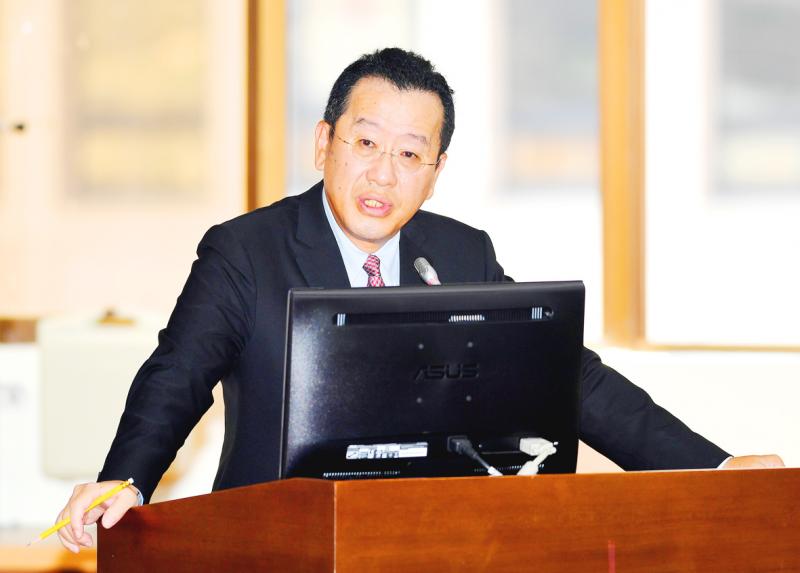The Financial Supervisory Commission (FSC) yesterday said it would consider easing regulations on life insurers’ real-estate investments to allow them to cut rents for tenants affected by the COVID-19 pandemic.
The commission might lower the minimum rate of return on insurers’ real-estate investments, which stands at 2.095 percent, FSC Chairman Wellington Koo (顧立雄) told a meeting of the legislature’s Finance Committee.
Koo’s comment came after the Life Insurance Association suggested the FSC trim the minimum rate of return so insurers could cut rents to help affected tenants, such as restaurants, hotels, travel agencies and department stores.

Photo: CNA
While the association suggested a cut of 50 basis points, Koo did not reveal how much the reduction would be, only saying that the commission would make the decision within two weeks.
The commission would also conduct inspections to see if life insurers did lower rents for their tenants, Koo said.
The minimum rate of return on insurers’ real-estate investments was set in a bid to ensure that insurers have enough liquidity to pay out compensation, he added.
Domestic real-estate investments help insurance companies maintain their cash flow with stable income from rent and ease the pressure from potential losses from foreign-exchange transactions, the commission said.
Leading landlords Cathay Life Insurance Co (國泰人壽), Shin Kong Life Insurance Co (新光人壽), Fubon Life Insurance Co (富邦人壽) and Nan Shan Life Insurance Co’s (南山人壽) reported rental incomes of NT$7.95 billion (US$262.3 million), NT$3.15 billion, NT$3.04 billion and NT$2.91 billion respectively for the first three quarters of last year, data from the companies showed.
Addressing the issue of mortgage rates, Koo said the government had asked state-run banks to lower interest rates on loans of less than NT$10 million by 50 basis points to ease debtors’ burden.
The commission has also requested that all banks lower their mortgage rates by at least 25 basis points, after the central bank cut its benchmark rate by the same ratio last week, he said.
However, privately run banks are not likely to follow suit, as they have said it would not be fair to reduce the interest rate for all debtors, but they would consider trimming rates for those affected by the pandemic, he said.
As the Central Epidemic Command Center has suggested people avoid indoor gatherings of more than 100 people, Koo said the commission would encourage listed firms to hold outdoor meetings and use electronic voting to reduce the number of attendees at shareholders’ meetings.
Last year, 23 listed companies saw more than 100 people attend their shareholders’ meetings, the commission said.
Separately, the central bank yesterday said it has slashed the interest it pays financial institutions on reserves that originate from passbook and time deposits to reflect market interest rates.
The central bank is to pay an interest rate of 0.068 percent on reserves from passbook deposits and 0.560 percent on reserves from time deposits, effective today, it said in a statement.
The new rates represent reductions of 0.078 percentage points and 0.260 percentage points for their passport and time deposits respectively.
Interest is paid to financial institutions’ B accounts, which constitute 55 percent of their reserves, while the central bank does not pay interest on A accounts, which make up the remainder.
Additional reporting by staff writer

Taiwan Transport and Storage Corp (TTS, 台灣通運倉儲) yesterday unveiled its first electric tractor unit — manufactured by Volvo Trucks — in a ceremony in Taipei, and said the unit would soon be used to transport cement produced by Taiwan Cement Corp (TCC, 台灣水泥). Both TTS and TCC belong to TCC International Holdings Ltd (台泥國際集團). With the electric tractor unit, the Taipei-based cement firm would become the first in Taiwan to use electric vehicles to transport construction materials. TTS chairman Koo Kung-yi (辜公怡), Volvo Trucks vice president of sales and marketing Johan Selven, TCC president Roman Cheng (程耀輝) and Taikoo Motors Group

Among the rows of vibrators, rubber torsos and leather harnesses at a Chinese sex toys exhibition in Shanghai this weekend, the beginnings of an artificial intelligence (AI)-driven shift in the industry quietly pulsed. China manufactures about 70 percent of the world’s sex toys, most of it the “hardware” on display at the fair — whether that be technicolor tentacled dildos or hyper-realistic personalized silicone dolls. Yet smart toys have been rising in popularity for some time. Many major European and US brands already offer tech-enhanced products that can enable long-distance love, monitor well-being and even bring people one step closer to

RECORD-BREAKING: TSMC’s net profit last quarter beat market expectations by expanding 8.9% and it was the best first-quarter profit in the chipmaker’s history Taiwan Semiconductor Manufacturing Co (TSMC, 台積電), which counts Nvidia Corp as a key customer, yesterday said that artificial intelligence (AI) server chip revenue is set to more than double this year from last year amid rising demand. The chipmaker expects the growth momentum to continue in the next five years with an annual compound growth rate of 50 percent, TSMC chief executive officer C.C. Wei (魏哲家) told investors yesterday. By 2028, AI chips’ contribution to revenue would climb to about 20 percent from a percentage in the low teens, Wei said. “Almost all the AI innovators are working with TSMC to address the

Malaysia’s leader yesterday announced plans to build a massive semiconductor design park, aiming to boost the Southeast Asian nation’s role in the global chip industry. A prominent player in the semiconductor industry for decades, Malaysia accounts for an estimated 13 percent of global back-end manufacturing, according to German tech giant Bosch. Now it wants to go beyond production and emerge as a chip design powerhouse too, Malaysian Prime Minister Anwar Ibrahim said. “I am pleased to announce the largest IC (integrated circuit) Design Park in Southeast Asia, that will house world-class anchor tenants and collaborate with global companies such as Arm [Holdings PLC],”